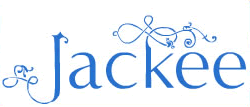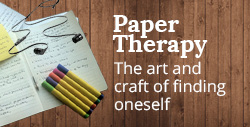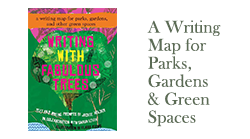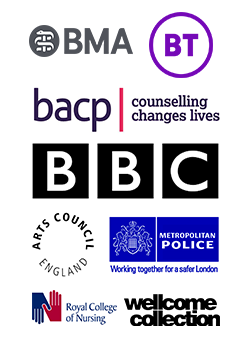Coaching
Monday, July 29th, 2013
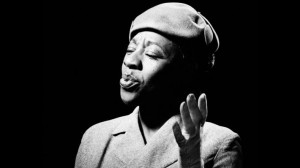
Thought I would share some of the ways in which I am getting creatively fed this week. I am getting re-sourced through a combination of creative excursions and Artist dates. I love August as it’s the one month of the year I take scheduled time off and have time to kick back, carry out new research, complete or scrap old projects and bring things together for what is now being referred to as the new January – September.
My creative nights out this week include:
A visit tonight to watch the theatre production of Amen’s Corner by African American playwright and author James Baldwin at the National Theatre
http://www.nationaltheatre.org.uk/shows/the-amen-cornerat
Tomorrow night it’s an evening attending Nights Out: Drinks With Virginia Woolf organised by The School Of Life. I love the outdoor events scheduled by the School Of Life. This event is described as being guided through a menu of conversation topics designed specifically around the work of Virginia Woolf around the grounds of Fenton House, Hampstead Heath.
http://www.theschooloflife.com/shop/drinkswithvirginiawoolf/

And on Thursday evening billed as the hottest day this week I’ll be in attendance at what seems like an amazing local event close to where I live in Nunhead Cemetery as part of the Nunhead Festival.
Biped’s Monitor is described as a surreal performance at dusk in the trees, chapels and avenues of Nunhead cemetery. Can’t wait.
http://www.lovenunhead.co.uk/events/bipeds-monitor/

I guess the Muses are busy at work this week.
No Comments
Monday, July 29th, 2013
Here are a couple of video clips from our event yesterday with the Fab At 40! Fullfilled at 50! Annual reunion breakfast hosted by Ladies Who Lunch UK:
http://ladieswholunchuk.com/
Jackee_Clip_2
Jackee_Clip_1
No Comments
Monday, July 29th, 2013
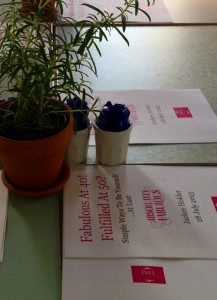
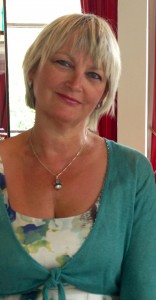
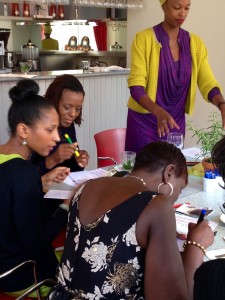
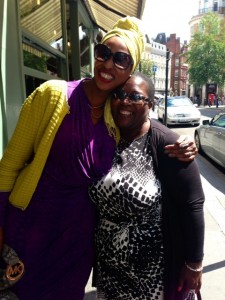
Our lovely meeting room at Carluccio’s in Covent Garden gave us a warm return welcome yesterday to our second annual reunion of the Fab at 40! Fulfilled at 50! gathering of women. Over Sunday morning orders of fresh mint teas and lattes accompanied with fresh juices and an Italian styled breakfast we enjoyed each other company as well as quality time focusing on ourselves.
Hosted by Ladies who Lunch http://ladieswholunchuk.com and facilitated by moi we had an amazing morning of live-shopping, stories that did make us laugh out loud along with a round of juicy conversations made up of conversations we don’t make room for in our everyday. This prompted some great connections amongst the group, with several overheard, “ Now that’s a great question,” along with lots of laughter.
Our time together could have easily stretched into the whole day but nonetheless was time well spent. We had time to hear updates on the journeys each woman has been on over the last year from staying true to their true life purpose, mindfully leaving a job that just wasn’t right to taking control of our health and well being and getting lives and health back on track.
Towards the end I did a couple of informal/impromptu coaching sessions as we shared over our delicious breakfast’s of a medley of tropical fruit, poached and scrambled eggs and what looked like flavoursome strips of well grilled smoky pancetta. Yes I was eating a bowl of fruit with yoghurt looking longingly into the other plates wishing……
We wrote letters to our future selves, which we will receive in a month’s time from a member of the group. It was great to see the gusto and the child like energy, which filled the space as the group creatively, decorated the outsides of their envelopes. We all commented on the noticeable absence of handwritten letters through our letterboxes and how much this was missed.
It was a great investment to spend quality time in the company of other women, reviewing, reflecting and refocusing on our futures as well as reclaiming the past.
We all left with one word that we will embody to take us through the next six months. My word was ‘Harvesting’
I look forward to year three of the annual morning breakfast for the Fab at 40! Fulfilled at 50! group.
In the meantime enjoy a few photos from our morning and time together along with a couple of video clips from the live-shop.
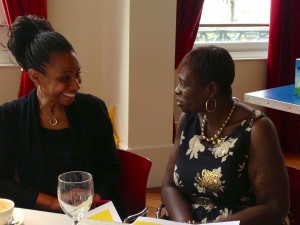
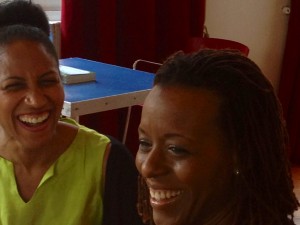
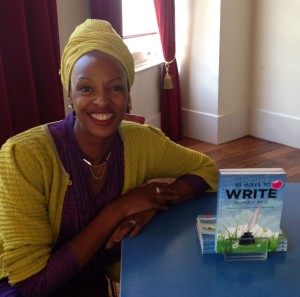
No Comments
Friday, May 31st, 2013
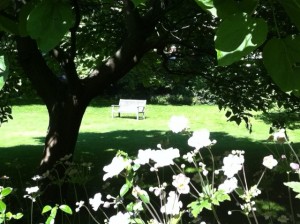
In Wednesday’s post I wrote about the importance of non-negotiable Self Care practices and why these need to stay on top of our list especially during those times when we feel overwhelmed and stressed out.. Below see the practices that made my Top Five Non Negotiable Self Care Practices that help me stay on top when the going gets tough.
Jackee’s Non Negotiable Self Care Practices
1. Journal writing first thing on the morning is one of the finest ways I know of clearing my head and allowing me that inner space to connect with myself wholeheartedly. I can write anything I want on the page without repercussions. There’s no need to censor what I write and there’s no one looking over my shoulder to judge. It often leads to me feeling better and clearer.
2. One twenty minute walk at least once a week gives me the focus and clarity I need when my mind feels crammed and the to do list feels unmanageable. Walking is grounding and a natural way for me to get more present with the moment. When I walk it often takes me very quickly out of my head and puts me into my body. My senses become more fine-tuned and I will become more observant and conscious.
When I am more present with the moment then I can step back from what ever is stimulating and engaging the stress to gain new insights and perspectives?
Walking I become much more acutely observant of my environment my creativity surges and I move to naturally take photos of what captivates me as I walk.
Quite a lot of cross-referencing and free association happens too when I walk. By the end of a twenty-minute walk a knotty problem unravels it’s self and is virtually solved.
3. By having at least one evening off a week no matter how stressed out I maybe from texting or emailing restores my sapping energy. Of course easier said than done but how great it feels when it happens. It’s great to give the mind space to rest from the electronic overload we go through everyday and it’s vital for our health and psychological well-being.
4. Promise yourself at least one early night to get to sleep by 10pm. A few nights ago I broke the remote for the bedroom television set. So now I’m enjoying the space reading in bed and staring at the beautiful lampshade that adorns our ceiling. Sleep is a great stress reliever and will return us to our worked energized and refreshed.
5. Being kind to myself and giving myself permission to meditate for at least 10 minutes each day is like taking a magic pill. I’ve now taken to meditating in-between the gaps in my day. I go about my day consciously taking in long, swirling gasps of deep breaths. It feels like manner for the soul. I find the practices of mindfulness and meditating deeply nourishing and rewarding on so many levels. It leaves me feeling calmer and more focused and provides instant relief.
What would go on your list of 5 Non-negotiable self-care practices that would stay in place when the going gets tough?
1 Comment
Wednesday, May 29th, 2013
 Vivienne McMaster has the most delightful website www.viviennemcmaster.com and recently wrote a post on the topic of non-negotiable self care, click here to read her post: http://www.viviennemcmasterphotography.com/2013/03/22/my-company-self-care-policies/
Vivienne McMaster has the most delightful website www.viviennemcmaster.com and recently wrote a post on the topic of non-negotiable self care, click here to read her post: http://www.viviennemcmasterphotography.com/2013/03/22/my-company-self-care-policies/
In the post she talks about the requirement for non-negotiable self care. Since reading the post I’ve been thinking a lot about what would go on my own list of non-negotiable self-care practices.
When we’re under stress, feeling overwhelmed our self-care practices ate the first to fall by the wayside. But what if our self-care during these times of increased tension and pressure we actually placed more importance and commitment to those self-care practices that support and nourish us as we navigate our way with grace through more stressful times.
McMaster is right when she says that these times and practices are just as important as the times we spend in front of the computer or in meetings.
What if 5 minutes of meditation rewards you with 50 minutes of fresh thinking throughout your day?
In my book Be Your Own Best Life Coach I write about a habit I adopted called Strategic Deceit. This is where if I need a day dedicated to writing I actually write the day as a meeting into my diary. This way when I get a phone call or receive an email asking for a meeting or for some kind of work to be done on that day I can confidently say that I am already booked out. This way I give the same importance to my writing and creative work, as I do to meetings and other forms of the business that often supersede our creative work.
Recently on my way to work to deliver a training course I abandoned the crowds of people trying to get down the escalators at Highbury & Islington tube station and decided to walk from the station to the Angel.
My walk along Upper Street turned into a wander and I enjoyed drinking in the fresh morning air and the thinking and sensing space that walking freed up in me.
By the time I arrived at my destination of the sultry landscape of Kings Cross St Pancras I felt like my body had been given a mental, physic and energetic work over. Walking is on one of my non-negotiable self care practices for this reason. As much as I might resist it or convince myself I don’t have time even a 15 minute walk leaves me feeling replenished in some way.
No Comments
Tuesday, May 28th, 2013
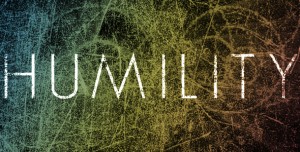
“To embody humility means to make the effort to listen to and accept others. The more we do this, the more we will be held in high esteem and the more we will be listened to. One word spoken in humility has the impact of a thousand words.” – Living Our Values, The Brahma Kumaris
This quote from Living Our Values expresses wholeheartedly the essence of what I was wanting to communicate in the previous blog post.
When we activate and find ways of bringing our values alive the impact is remarkable.
How often will words shared and expressed through the value of humility make a difference?
- What are your thoughts and feelings about the above quote?
- Have you began answering any of the questions from the previous blog posts?
No Comments
Tuesday, May 28th, 2013
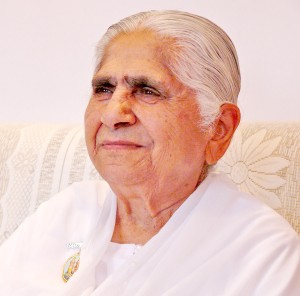
Last week I was a panel member at the launch of a very important book Living Our Values: An ‘inside-out’ approach to change your world for the better, published by the Brahma Kumaris in the presence of Dadi Janki the 97 year old Spiritual head of the Brahma Kumaris.
I’ve been working with the Brahma Kumaris for the last five years and have loved every moment of presenting and contributing to a few of the many projects facilitated by the Brahma Kumaris including, The Spirit of Coaching and Living With Cancer, workshops, retreats and seminars.
My time working with the BK’s is voluntary but I feel that I am very well paid as I always leave with such wisdom and internal guidance for my own spiritual and emotional development.
There’s so much about what the BK teaches that overlaps with the work of coaches and today I want to highlight the common area that both approaches share which is that of Values.
So often it can be easy to forget about asking our clients about their values, which are often the root of who they are and how they show up more exquisitely in their role as leaders and human beings. The chapter on Respect in Living Our Values open’s with this powerful quote,
“When you are content to simply be yourself and do not compare and compete, everybody will respect you.” – Lao Tzu
When I read this opening quote it really caused me to pause and reflect in a meaningful way, revealing an Inquiry question, the type of question that Coach Patrick Williams in his book, How To Become A Professional Life Coach, suggests we offer our clients as a way of deeper inquiry. I immediately connected with how spending time exploring our values allows us to show up and to express more of our authentic selves.
When we make those connections to our values we are more able to communicate and connect with others particularly in times of conflict and difficulties.
For example one of my core values is respect. So when I am able to be consciously aware of this value as I go about my day-to-day business it means I am consciously choosing and responding to others from this base line of respect and value.
When I am not connected to this value my communication and responses may be snappy and harsh, not thought through or defensive. Values and our conscious connection to our values in the present moment changes how we express ourselves and who we are in any given moment.
Take any value and you will find that once consciously embodied, expressed or even acknowledged you will experience more of the person, you will feel them and sense them.
On the panel at the launch of Living Our Values we were asked three questions:
- How important are values?
- What is your most important value?
- What value do you believe the world needs most at this time?
These are questions that can be included on a Coaching Joining form sent to your new clients before your ever first coaching session. How wonderful to dive into the beautiful deep ocean of the expansive possibility of who people really are and find out what really feeds their core through engaging in a dialogue about personal values.
Even more importantly as coaches we can and must answer these questions about values for ourselves. We cannot expect these questions to be answered until we are brave enough to dive in and answer them for ourselves.
On the panel I used the metaphor of the tree’s root as a reflection of how our core values feed our behaviours, our thoughts, our action, or well-being or un-well being.
Too often we dive into our work superficially without wanting to unravel these deeper driving forces. By bringing values into the forefront and exploring how we are expressing these core values in our work, in our relationships in our meetings and encounters with the public and with strangers many issues and problems will be gracefully dissolved.
Reflecting on what value was and is most important to me right now in my life I realise that it is the value of respect. I experience this value being sadly neglected in so many ways in organizations. Change brings with it a season of emotionality and we as individuals and a collective are notoriously poor at increasing the quantities of respect we heap onto others as they go through turbulent and difficult times.
It seems easier to go against our values and walk someone through the life changing experience of redundancies than to express the values that we hold dear somewhere deep inside but we find hard to express. It is easier to be distant, even aloof than to find the many way we can express our respect and still maintain boundaries and professionalism.
A good way of addressing this is to work through the practical exercises outlined in Living Our Values. Taking a notebook and setting aside 30 minutes will give even the faint hearted an opportunity to begin to stoke the fire around what values mean to them and to recommit to ways in which their values can be shared more explicitly in all that they do.
Here’s one of the practical exercise you will find in the points for reflection at the end of the chapter on Respect.
1. What does respect mean for you?
2. Think of someone who is an inspiring example of respect. What makes them so special? What are the secrets of their success?
3. In what ways do you demonstrate respect for yourself, for others and for nature?
4. Are there any areas in your life where you would like to be more respectful? What discourages you or prevents you from doing this?
5. How could you develop the value of respect in your life?
Living Our Values: An “inside-out approach to change your world for the better is published by the Brahma Kumaris www.bkpublications.com 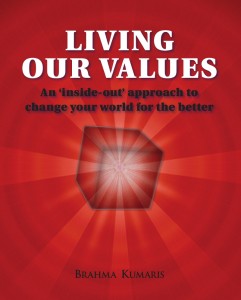
No Comments
Thursday, May 2nd, 2013

The Bright Field
I have seen the sun break through
to illuminate a small field
for a while, and gone my way
and forgotten it. But that was the pearl
of great price, the one field that had
treasure in it. I realize now
that I must give all that I have
to possess it. Life is not hurrying
on to a receding future, nor hankering after
an imagined past. It is the turning
aside like Moses to the miracle
of the lit bush, to a brightness
that seemed as transitory as your youth
once, but is the eternity that awaits you.
~ R. S. Thomas ~
I have been thinking a lot about the many conversations I have with individuals I coach, teams I work with and coaches I train. No matter what our roles and positions everyone seems to be afflicted with a constant busyness and overwhelming list of tasks and things to do, myself included.
But the one thing that allows me to bring my whole self and sanity back into my work is a fundamental belief in mindfulness, engagement in a reflective and creative practice on a regular basis and a deep sense of meaning and purpose that I draw from my spiritual path and beliefs.
I am noticing how many of our conversations reside in the future, deeply seated in the what if’s. On training courses the cynics and critics in the group will quickly make themselves known by the phrase, “ But what if… ?”
Our preoccupation with the past and the future and what could, and notice the emphasis on could, erodes our ability to be aware and fully present in the here and now. It shuts off our innate ability to draw on an arsenal of resourcefulness and creativity. A lack of mindfulness shuts us down to our best thinking. Just think about how much is missed when we are constantly pre-occupied with being elsewhere in bodies and in our minds.
I find this preoccupation happens a lot with coaches whether experienced or new to coaching. It’s so easy to fall back into the trap of getting caught up with the voices in our heads which vocalize thoughts and feelings based on past experience, usually negative or unconstructive dialogues or they become tangled or muddled with future thinking about what or how we think we should or shouldn’t be performing. All of which dulls the quality of our attention and awareness on the person we happen to be working with. One could suggest we are mere shadows of ourselves when we work from a lack of mindfulness awareness.
Speaking on a video about mindfulness from the School Of Life, Professor Mark Williams read the above poem by R. S. Thomas.
The poem reminds us that, “Life is not hurrying onto a receding future, nor hankering after an imagined past.”
Mindfulness is important for all parts of our life from work to the personal. When we allow our thoughts to rob us of the goodness of a moment, any moment, whether it is stealing us away from the taste and sensory experience of the food we are eating, to the experience of really receiving the person we just brushed past without really looking at to not really listening and being present in the conversation we are having, we are shutting ourselves down to so much of what is alive and vital in the moment ad inside of us.
How much is missed we can ask ourselves? Automatic pilot does not get more done, although many of fall into the trap of believing that it does. In fact research has shown it lessens the effectiveness of our ability to be creative. In my mind that means it impacts on the quality of our decisions, the quality of how we manage and lead. It impacts on so many layers of our personal and professional lives.
In the training of coaches I am engaged in we make a real effort to encourage coaches to integrate a reflective and mindful presence in their work as coaches and beyond the role of the coach both at work and at home. I am always encouraged when managers and leaders participating in some form of coaching training say how much a difference coaching is also making in their personal and family lives.
Of course we teach coaches the models and tools required but in the same breadth we invite them to lay down the tools and techniques when required and do what the therapist, Irvin Yalow was quoted as saying. “Technique is what you use until the therapist arrives,” So often coaches new to coaching will hold on tightly to techniques but as Yalom says we will no longer require holding onto the techniques as much when we fully arrive and are present in the moment with both ourselves and the coachee.
Try these simple mindfulness techniques, which will attune the quality of your awareness and ability to be more engaged and mindful throughout your day. These techniques can be used before, after or during your coaching sessions when your awareness wanders, you become distracted or preoccupied or you simply want to improve your mindfulness capabilities.
One Minute Breathing
Focus on your breath for one minute. Focus on the rise and the fall of the breath even in the event of lots of thoughts flooding the mind.
Mindful Observation
Choose an object that is visible right now in the space you are in. Put your focus and attention on the object for one minute. Once the minute is up continue mindfully observing as long as you are able to.
Give Your Brain A Break
Take 5 minutes in-between a meeting or a conversation and daydream. Focus your attention or awareness outside a window, close your eyes or stare into space.
Mindful Eating
Choose one of your daily meals and eat it as mindfully as you can. Before you taste anything on your plate, take in the colours and the smells. Get curious about where the food came from. What does the aroma’s of the food remind you of? If there is no smell imagine what the smell should be like. Take tiny bites and savour the food on your tongue so you can accentuate and stimulate those taste buds.
Mindful Body Scan
Take 5 minutes to carry out a mindful body scan. Close your eyes and relax your breathing. Make sure you are standing or sitting comfortably. Give yourself permission o do nothing with your emotions or feelings except to notice them. Starting at the base of your feet talk yourself through a mindful body scan of each region of the body.
Move your awareness from the soles of your feet, up your legs and thighs and so on until you reach the crown of your head. When you have arrived at the top of the head take three deep breaths and rest quietly and just notice how you feel. This mindfulness practice will bring you more physically and mindfully into your body. Try before a coaching session.
Coaching Question For You
- What activities help move you into a mindful state?
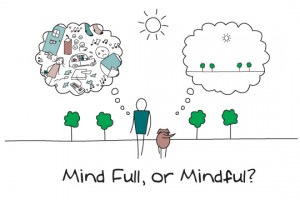
image:www.deborahwilliamson.co.uk
1 Comment
Thursday, April 25th, 2013
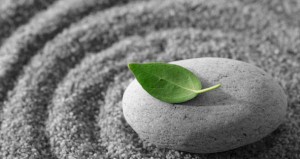
Some closing thoughts on Happiness from Sister Maureen from the Brahma Kumaris. You can watch the video here:
http://www.youtube.com/watch?v=DjHYwQeNm7Y
Find out more about Spirit Of Coaching Events at http://www.bkwsu.org/
The miracle of happiness: Happiness increases when you give it away… When you give happiness and you share happiness it increases for you.
The transformative power of happiness it is not just for the self. It is something that can transform an atmosphere and the environment. You can only share happiness in this moment now.
Sharing an atmosphere of happiness helps people to be able to see solutions to their own problems. At first I thought I had o fix everyone’s problems. You are using them to make you feel good, feeding the ego of approval. I think I am doing good, when I am just serving myself.
Final Tips on How To Happy In Challenging Times from Mike George & Robert Holden
Robert Holden
Tip 1
Have a daily spiritual practice. Take time for out with yourself
Tip 2
Life doesn’t happen to you it happens for you. So work on it.
Tip 3
Read one of Mike’s books.
Mike George
Tip 1
Meditation, everyday, twice a day and reflection
Tip 2
What’s in the way is the way.
Tip 3
Find a way to share and to give what you are realizing. Pass it on. Find something everyday to share with others.
Big Thanks for a great event to:
John McConnel Founder of the Spirit of Coaching
Davina Lloyd (Host of the Event)
Judy Apps (How To Be Happy Workshop on the day and Spirit of Coaching planning group member)
Jill Davis & Neil Jordan (Spirit of Coaching Planning Group member)
Sister Maureen (Director of at the Brahma Kumaris)
Blanco for Brahma Kumaris Spain who flew in especially for the event
All of the BK volunteers and helpers on the day
No Comments
Thursday, April 25th, 2013
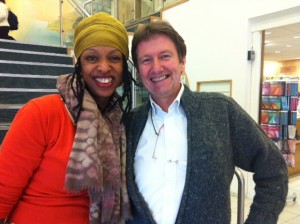 Mike George another one of my favourite spiritual teachers and coaches really drilled down into the psychology of Happiness and really unraveled in his clear steps and guidance of what stands between us, and our happiness.
Mike George another one of my favourite spiritual teachers and coaches really drilled down into the psychology of Happiness and really unraveled in his clear steps and guidance of what stands between us, and our happiness.
Here are the main elements of his talk on How To Be Happy In Challenging Times: Watch the video here: http://www.youtube.com/watch?v=DjHYwQeNm7Y
Mike described three primary feelings when we are in a happy state:
Ask yourself: What it is it that is sustaining this particular feeling?
1. A state of feeling of contentment. This is the deepest form of happiness. When I am content I notice I ask the question how do I sustain the state of contentment? When we are in a state of contentment we are not touched by anything or affected by anyone or anything that’s going on around me or outside of me. If I am going to sustain contentment that I have to accept everyone and everything as they are, as it is at every moment. The moment I move into a state of non- acceptance, disapproval. The moment I allow myself to be affected by anything around me then my state of contentment disappears. I’m responsible for that state and all states that I feel.
2. A state of joy or joyfulness. Joy is noticed in the in-experience when we are in the process of something. What is the process that sustains joyfulness? It’s in the process of being creative. Creativity, maybe the primary impulse of the human spirit. It’s the one thing we are all doing all the time the deepest impulse of the human spirit is to create and be creative. The deepest impulse of the spirit is to create and the deepest level of creation is to create our own state of being. Joy for me is felt when I am in the process of being creative. If you ask the mundane levels of the creative’s, the poet, the painter or the writer they will tell you there’s a great joy in the creative expressions that they are using to bring something together to manifest something in the world. That joy is present because you lose awareness of the passing of time. Joy is the feeling that arises when we are doing what is natural to us, which, is to be creative.
3. A state is Bliss. When the human spirit is free there is this feeling of blissfulness.
Happiness as a state of consciousness is our most natural state.
7 Key Toxins That Compromise Our Natural State Of Happiness & The Best Questions To Ask Yourself About What Gets In The Way Of Our Happiness
The toxins are all of beliefs and are the beliefs we absorb throughout our life and get in the way of a state of happiness
1. Happiness is something that is acquired. Acquiring the objects, the things or the person there is a little high and then followed by a low. The upper that is required when we acquire things is temporary and short-lived and is stimulated from outside in. It doesn’t come from within my own state. It’s not my own state. Those are the signals that acquiring things doesn’t make me happy. Ask the questions: What is it that you believe that is going to make you happy when I acquire it? Make a list – be very honest. Then ask: Am I Sure? Live in the question. The answer is probably No; acquiring stuff does not make us content, joyful or blissful.
2. Happiness is an achievement. We’re driven to achieve goals before we believe we can be happy. When you achieve your goals there is a little moment, but what happens next… we are off chasing another goal. Achievement is always in the future. Happiness can only be now. This belief has us struggling and delaying our happiness. Ask the question: What do I believe I need to achieve in order to be happy? Make a list – be honest. Reflect. Then ask: Am I sure this is what is going to make me happy?
3. Happiness equals excitement. We believe excitement equals happiness. Many of us believe we have to be excited to be happy. Excitement is what happens in the kettle when the water boils. The molecules are agitated when the kettle boils. Am I happy when I am agitated? Happiness is this contented state, this natural flow into the world. Ask the question: What is it I believe that I need that makes me excited to bring me happiness. Reflect. Make a list – Be honest. Then ask: Am I sure?
4. Happiness is about dependency. I need someone else to be happy and create my state of happiness. I need to be depend on someone or something before I can be happy in myself. All dependency leads to all forms of addiction. Ask the question: What do I believe I need to be dependent on to make me happy? Who do I believe I need to be dependent to make me happy? Make a list – Be honest. Then ask: Am I sure? Is this true?
5. Happiness is about attachment. You cannot be happy if you’re attached to anything. Where there is attachment there must be some fear. Fear of loss or damage. The moment I become attached to anything I create some form of fear. When I am scared am I happy. When I am scared I am sabotaging my happiness. It’s someone else making me unhappy. Ask the questions: What do I believe I need to be attached to before I can be happy? Make a list – Reflect. then ask: Am I sure?
6. Happiness is relief from pain. This is not real happiness it is just relief. I am always waiting for some relief to be happy. Then I go searching for something to relive my pain. Ask the question: What do I believe I need to feel relief from before I am happy? Make a list – Be honest. Reflect. Then ask: Am I sure?
7. Happiness is success. This maybe the most powerful belief. We believe we have to compete or have to win in order to be successful. I have to be successful before I can feel happy within myself. So we spend our lives chasing some kind of success, believing we can’t be happy until we are successful. Ask the question: What do I believe I need to be successful at before I can be happy? Make a list – be honest. Reflect. Then ask: Am I sure? Is that true.
The process of spiritual awareness is raising our awareness to the presence of these toxins and sabotage our state of being and content. Waking up and seeing what is sabotaging and what is making you feel miserable and unhappy.
Find out more about Mike George at:
http://www.relax7.com/
No Comments
